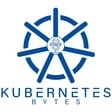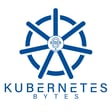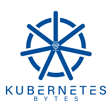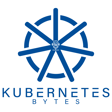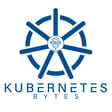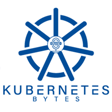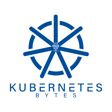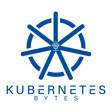Become a Creator today!Start creating today - Share your story with the world!
Start for free
00:00:00
00:00:01

Kubecon North America 2021 Recap
In this episode of Kubernetes Bytes, hosts Bhavin Shah and Ryan Wallner recap their experiences with KubeCon North America 2021. The hosts talk about their opinions in regards to the overall success of KubeCon NA 2021, their first-hand experiences both in-person as well as virtual and the various as news and announcements that relate to using data on Kubernetes.
Show Links
- https://kubebyexample.com/>
- https://www.cncf.io/announcements/2021/10/13/entry-level-kubernetes-certification-to-help-advance-cloud-careers/
- https://dok.community/dokc-2021-report/
- https://cilium.io/blog/2021/10/13/cilium-joins-cncf
- https://events.linuxfoundation.org/kubecon-cloudnativecon-europe/program/cfp/
- https://openssf.org/press-release/2021/10/13/open-source-security-foundation-raises-10-million-in-new-commitments-to-secure-software-supply-chains/
- https://www.youtube.com/watch?v=5Kc8BbiVDVU "Whats new in Kubernetes Storage - Xing Yang"
- Portworx - PX-Backup 2.1 - https://portworx.com/blog/introducing-px-backup-2-1/
- Red Hat OpenShift 4.9 and Advanced Cluster Management 2.4 - https://thenewstack.io/red-hat-openshift-4-9s-single-node-clusters-for-the-edge/
- NetApp Astra Data Store - https://www.crn.com/news/storage/netapp-debuts-astra-data-store-with-kubernetes-native-software-defined-file-services
- Google Anthos for VMs - https://cloud.google.com/blog/topics/hybrid-cloud/introducing-anthos-for-vms-and-other-app-modernization-tools
- IBM Spectrum Scale and Spectrum Protect Plus - https://www.ibm.com/blogs/systems/simple-resilient-hybrid-cloud-with-ibm-storage/
- SUSE Harvester - https://www.zdnet.com/article/suse-harvester-deploying-virtual-machines-with-kubernetes
- Akuity - https://venturebeat.com/2021/10/11/akuity-launches-to-be-the-argo-ent
Transcript
Introduction to Kubernetes Bites
00:00:03
Speaker
You are listening to Kubernetes Bites, a podcast bringing you the latest from the world of cloud native data management. My name is Ryan Walner and I'm joined by Bob and Shaw coming to you from Boston, Massachusetts. We'll be sharing our thoughts on recent cloud native news and talking to industry experts about their experiences and challenges managing the wealth of data in today's cloud native ecosystem.
00:00:28
Speaker
Good morning, good afternoon, and good evening wherever you are. We're coming to you from Boston, Massachusetts. Today is October 27th. I hope everyone is doing well and staying safe.
Impact of Nor'easter on Hosts' Activities
00:00:40
Speaker
Let's dive into it. Bhavan, how are you?
00:00:43
Speaker
I'm doing great like fall had been great but unfortunately we got hit with like a nor'easter this week so I'm just staying put don't want to get rained on and I'm just glad that I didn't lose power so yeah yeah for those of you in the northeast uh we have sort of our first nor'easter which usually comes with snow so I'm not uh I'm not mad about this nor'easter other than the fact that I you know outside is terrible
00:01:10
Speaker
I did not lose power as well but lost a few lawn chairs and umbrellas. I'll get them later, just spread out across the lawn. What have you been up to otherwise? I know we spoke about fall, being here and going to the White Mountains. I actually did a one-day trip and instead of going to
00:01:32
Speaker
like the most popular area with a lot of traffic, the Kankamungus Highway, I guess that's what it's called. I did see like an exit that leads to that highway like, okay, not going there, but then I ended up doing a hike with a few friends and that was great. Although I think
00:01:48
Speaker
the day I went there it might have been like post peak by a couple of days so then some of these are already gone still beautiful yeah still beautiful yes next time I think I need I want to do like that train ride oh yeah the pictures look really great there's a couple of them up there
00:02:05
Speaker
Yeah. So maybe next year we'll do that. But this year we did one hike and then this weekend it was it was good. Like it was not as cold as we will be soon getting.
Experiments with Drone Photography
00:02:18
Speaker
But we did like a 10, 11 mile bike ride in the afternoon. So that was fun. How about you?
00:02:23
Speaker
Yeah, I love that area up there. Honestly, we tried to do the train ride this past spring. Obviously not as beautiful in the fall colors, but still a very gorgeous train ride up in the Lincoln area. And it turns out that it books really quickly.
00:02:42
Speaker
Even in the spring, I wasn't expecting it to, and so we put it off, actually getting the tickets a little too late, so we didn't get to go. But we'll go probably next spring. We don't usually head up there in the fall.
00:02:55
Speaker
I enjoyed the fall down here. I've been actually doing a little bit of drone experimenting with some of the fall colors around here. Something I've dabbled in getting into more and more. I have a couple iterations of the tiny helicopters to the drone probably that I've had six years ago, which was one you
00:03:20
Speaker
could fly around your backyard and then I got a nicer one, which is one that you actually have to register with the FAA and all this stuff. Just getting more into that and found that really targeting some of the lakes and ponds around here with some of the fall colors is really quite fun. Personally, I'm not an actual remote drone pilot, so I can't do anything like sell my photos.
00:03:42
Speaker
Maybe one day, you never know.
Insights from KubeCon
00:03:44
Speaker
I think the FAA, the agreement that you signed doesn't allow you to like do anything commercial as well. So yeah, you are in the clear. If only you were on Twitter, we would actually get to see those pictures, but. Yeah, exactly. I mean, unless you get your like part 107 license, then you can actually do commercial stuff with it, which, you know.
00:04:02
Speaker
Who knows? Who knows of my future and holds? You are freshly back from KubeCon. I know in our last podcast we discussed sort of the week of KubeCon that we'd be talking about this. So this whole episode is about KubeCon. Our personal experience was with it as well as some of the news surrounding it. So I think the people want to know, Bobbin, how was KubeCon in real life?
00:04:30
Speaker
KubeCon was really fun. Again, full disclosure, this was my first one. I've always been a person who liked to go there, watched keynotes, watched sessions once they were posted on YouTube, but this year I was lucky enough to actually participate in the show and not just go to the event, but also work at the Portworx booth and have a lot of engaging discussions.
00:04:53
Speaker
This time, I think one key point was the more focus or more emphasis was on quality rather than quantity. I think we only had 3300 attendees in person and that might have been due to like indoor mask mandates, vaccine requirements that they had, and people just not being comfortable traveling right away.
00:05:13
Speaker
But then out of that 3300, I think close to 2000 were just vendors. So it was a really good conference if you just wanted to talk to other vendors and talk about partnerships. But then from a customer perspective, it was a bit sparse. But again, the level of discussions that you have, I've been going to VMworlds and Microsoft Ignite and the discussions there and the discussions at KubeCon are completely different.
00:05:37
Speaker
different personas. Obviously, there are still operators who are figuring out how can they run Kubernetes and what do they do for storage and the enterprise capabilities that they need if they are running containers in Kubernetes.
Focus on Cloud Native Data Management Day
00:05:49
Speaker
So those are always great discussions. But yeah, it was a lot of fun. And I also participated in a co-located event, Cloud Native Data Management Day. It was a day before. That was a lot of fun too. It was in the Grammy Museum.
00:06:04
Speaker
two blocks away from the convention center. Personally, I think the value of the museum was lost on me because I'm not a big fan of the type of music here. But I'm pretty sure people who follow those things might be excited for such a great venue. But the show was good. We had close to, I think, 50 people attend. Few were speakers and vendors at the event, but then we had a good number of attendees.
00:06:33
Speaker
There was a virtual component which is where all the technical and customer focused topics or tracks were. The main in-person event focused on panels since we had people together at the show. It was a great venue for having people from the community, the analyst community, different vendors like I participated in a panel just talking about data and Kubernetes data and storage.
00:06:59
Speaker
we dove into not just what CSI is and where it's going, but also object storage APIs.
Virtual vs In-Person Conference Engagements
00:07:05
Speaker
I think we had too much input from MinIO and how object storage is kind of the answer and MinIO is the answer for every Kubernetes need, but that was fun.
00:07:15
Speaker
But at the end, I think one of the key takeaways from that panel was we as storage vendors or vendors who provide community storage need to start focusing on applications, not just talk about plumbing and what CSI features look like or what APIs are now available. We need to move to that next level of talking about databases and data services because that's what developers mean when they're talking about storage. They don't mean
00:07:39
Speaker
a LUN or a file share. They mean a Postgres database or a Kafka deployment. It was a cool event. How about you? Yeah, that's a good point. I really like that comment there because as someone who's attended many, I should say many, a handful of Qcons because there hasn't been that many.
00:08:02
Speaker
I can't wait to experience a full-blown KubeCon. It is a whole different experience. I did not go to this one, so really curious to hear. But some of that component
Kubernetes Security and Operational Challenges
00:08:13
Speaker
of not just how things work, but I want to use them for something real. Now, I will say at previous KubeCons, it was a lot about how did you get this to work? How does it work? How do you provide this, right? So hearing you talk about how
00:08:27
Speaker
You know, people are really trying to solve real problems, which I think you have a note in here. We'll talk about more about what that really means. I really like that we're getting there in this community. So lots of exciting stuff there. And I'm glad I was the virtual coupon. I know you were going to like participate in that.
00:08:45
Speaker
Yeah. Honestly, virtual conferences are hard. I'll put it this way. Every virtual conference that I've been a part of these past couple of years, which I think has been three now, some internal, some external, there is minimal interaction. And I think part of the reason is all these virtual conference
00:09:09
Speaker
Platforms they do which they try to mimic what you you get out of in person and the reality is it's it's very different So mimicking mimicking it I think is the wrong approach people act very different online Than they do in person and that's that's just the reality of it and that's fine but I think we have to design these things in a way that
00:09:30
Speaker
expects that type of interaction instead of trying to mimic the in-person thing. One of the things was every booth had the ability to have sessions during certain times, office hours, and they're all at the same time. Really being able to target some of your audience or even if your audience was interested in yours, they'd probably have to trade off between yours and someone else's or choose it the next day or that thing.
00:09:59
Speaker
Even then, we had some people in those office hours, but it was very hard to interact with them again. That's just the nature of virtual conferences. In person, when you have those theater presentations at your booth, if you see a lot of people gathered around, you will head towards it. But if it's a virtual room, you don't know how many people are participating in other rooms. Exactly.
00:10:23
Speaker
Yeah, not the same. And we define engagement differently at the booth, right? You just get one perfect example. There's a lot of people over there. What's going on, right? I want to know. That's engagement to some aspect. And then there's online, you can't really mimic that, right? You can see, oh, there's a bunch of people in here.
00:10:38
Speaker
But I think, you know, we have to design it differently. Just like, you know, people are coming to click on links and get free stuff half the time. And they can do that easily online rather than, you know, actually an awkward question at the booth to get your pen. But yeah, anyway, I digress. It was good. I'm not knocking it too hard. I think the community was strong still there. Lots of awesome resources. And I had a lot of fun. Anyway, so
00:11:06
Speaker
For those listening, we do not have a guest today. It's just Bobbin and I. I hope that's okay. But we're really diving into KubeCon and some of the major highlights. We'll talk about community highlights as well as some of the vendor highlights and news articles that we picked in this community, in this data-associated community. Some of the highlights. I noticed that there was a lot
00:11:33
Speaker
a lot around security. Before I dive into security or any of the topics there, I think one of the points you just made earlier about people doing real things is we're getting somewhere in the community. I believe you wrote down the term here, crossing the chasm. Explain that a little more.
00:11:52
Speaker
That was a very popular theme across different keynote speakers across all three days, right? And that was a trend that we even saw on the show floor across different vendors trying to pitch their products. It's no longer about just day zero operations, like, oh, how can I install Kubernetes? Can I use Kube ADM? What's Kops? What are the different tools that are available for just installing Kubernetes on bare metal or virtual machines or in the cloud?
00:12:19
Speaker
It was more about operationalizing it. So not just about, okay, how do I monitor and the whole observability stack? But as you said, right, security, that was top of mind for everyone, especially with the hacks and ransomware attacks that we have been having in 2021. That was certainly top of mind. And especially if you're dealing with open source, how do you bring those security and open source together?
00:12:44
Speaker
And there were vendors trying to help out there were like, even if it was like a storage related conversation, there was always the security element like, okay, how do I encrypt my data? Is it encrypted at rest or in transit? So again, that was a theme that we saw and not just security and.
00:13:03
Speaker
observability, but also right sizing applications. So if people have figured out how to run applications on virtual machines and how to right size those, but then how do you use the same tools or how do you find new tools to help you do that for containers and Kubernetes as well? So how do you make sure that you're not over provisioning your Kubernetes clusters, not just from a storage perspective, but also from a CPU and memory perspective and
00:13:28
Speaker
trying to get the biggest bang for your buck. So it was all about, it's not just those early adopters and bleeding edge organizations. It's now Kubernetes has become a thing that's being widely adopted and people are building applications for the future on Kubernetes. So that was like one key takeaway for me right there.
00:13:47
Speaker
Yeah, there's some really good points there. And I think I did talk about the sort of bill of materials later on in one of the topics just because associate with the security, I think with real use case comes with the adoption of how do I secure this thing? And some of I know the talks and associated with sort of Biden's executive order, which includes that
00:14:15
Speaker
Bill materials is all really, really interesting and validating to the same point. So it's really great that we're getting here as a community and these are the overarching topics that we're talking about because it means we're succeeding as a community and building real things.
00:14:35
Speaker
Personally, the software bill of materials, part of the keynote on, I think, day three, that was a really good one, how they spoke about not just Biden's executive order and how the White House is only going to order from vendors that can present us SBOM, but that has
00:14:53
Speaker
and a widespread effect. So like USFTA Food and Drugs Administration is also enforcing SBOM requirements. And you will see this not just from public sector, but also private companies now enforcing these requirements. So as part of open source projects, as part of companies that use these open source projects, you'll have to start thinking about SBOM and start participating in those communities.
00:15:16
Speaker
100%. And to your point earlier, there's been a lot of news when it comes to security flaws. I mean, I just got a letter yesterday from the hospital that my daughter was born in that was like, hey, your child's information might have been stolen. They were like, someone had access to email for six months. And I was like, you know, it's kind of sad because at one point I'm like, this is just the way the world is. That was my reaction. It was like, we got to protect ourselves in other ways.
00:15:46
Speaker
But the fact that software and the ecosystem, not just around Kubernetes, has gotten to that point where it's just like, it happened again, is the wrong attitude. So I think really, this is a make or break point. We have to do something about it. This is maybe step one, and really developing those standards and doing them better is going to help all of us.
00:16:10
Speaker
not just in Kubernetes. So maybe let's just try to get it right from the beginning. We'll see how it goes. Let's dive into some of the community highlights that we noted here. So why don't you start with the KCNA.
00:16:26
Speaker
and move on. So again, all of us know that Kubernetes or CNCF has had certifications that you can take from the cloud Kubernetes certified Kubernetes administrator to application developer. They added the security specialists last year and this year they have a more entry level or an associate level certification called Kubernetes and Cloud Native Associate, KCNA, if I got that right.
00:16:51
Speaker
But yeah, so Priyanka actually introduced it during her keynote on day one. And she said we are just accepting some beta and trial users. And the certification will actually be launched in December. But then within like five minutes, all the beta spots, I think they were like 400 spots were gone. So people are really interested in KCNA. And obviously, that helps us expand the community and bring more people in who know what Kubernetes is or what cloud native is. So something for you to look forward to.
00:17:21
Speaker
Absolutely.
Data on Kubernetes Report Highlights
00:17:22
Speaker
And I believe the CKS was announced as well, right? Which is the Certified Kubernetes Security Specialist, or I believe that was announced, that exam, at least part of it.
00:17:37
Speaker
It could be wrong there, but I'm pretty sure it is. It's good timing, right? With all the news around security, I think these certifications are going to be key for what the community is trying to do. I definitely wanted to talk about the first edition of the Data on Kubernetes report. If you're asking what is that, Ryan, on the podcast, I will include a link to this.
00:18:04
Speaker
the doc community which does a great job at really highlighting how practitioners and users of of storage and data on Kubernetes are really using the thing put out this survey for the first time I think it's they have
00:18:19
Speaker
500 executives and technology leaders is how they put it here that use data and the factors during the adoption. So a lot of really cool findings here. Some of them surprising, some of them not surprising. One is that data is actually being used on Kubernetes. I think to us, that's not surprising. If you're not there yet in your organization, it's just telling you it's here. People are running data workloads on Kubernetes in production.
00:18:48
Speaker
I think one of their stats was 90% believe it's ready for staple workloads. 90 is pretty good, if you ask me. But there are significant challenges that remain. So saying it's ready doesn't mean that poof, we're solved. There's a lot of challenges that still remain if you're going to go towards running data on Kubernetes, things around quality.
00:19:11
Speaker
of operators to trusted vendors and all those things. So definitely go take a look at that. Lots of good information there. Like one of the stats that got my eye was they asked people how much more productive you are as an organization once you adopted Kubernetes. Like 19% said that they're like twice
00:19:33
Speaker
if not more productive because of like Kubernetes and like 38% were like 50% more productive. So this shows that, okay, there might be challenges and troubles and a whole migration effort required to adopt Kubernetes and containers. But once you do that, you will start seeing benefits and there are people and there are organizations that participate in the survey who can vouch for those. So yeah.
Upcoming Kubernetes Events and Certifications
00:19:56
Speaker
Of course, and it also depends on where you're coming from, right? Greenfield, it's going to be a very different response and answer to someone who's been running OpenStack for 10 years and needs to migrate to Kubernetes or something like that. Cool. So I know you touched on Cloud Native Data Management Day. You and I personally have five talks.
00:20:16
Speaker
I know in there. So shameless plug to go check those out. We'll put those in the link. You want to learn more there. But the panel, you talked briefly about it. Anything else you want to note about me in a management day? No, I think that's it. Other than the acronym being especially hard for me to talk to say today. OK, great. And then the CFP for cloud native con Europe is now open, right?
00:20:44
Speaker
Yes, it is like we need to put our thinking caps on and start brainstorming. What can we be like this time? We didn't end up submitting any sessions, but maybe for the Europe one or we should start thinking about topics. And again, this goes for everybody in the community listening to this. Start thinking and submit your talks. It's in Valencia, Spain. So in Spain in May, that sounds beautiful. Hopefully we can all go.
00:21:09
Speaker
I'm optimistic. Great.
New Storage Features in Kubernetes 1.22 & 1.23
00:21:14
Speaker
I think one of the last things I want to talk about before I move on is Xing Yang has a video about what's coming in Kubernetes storage. I just want to highlight, she talks about what's in 122 versus what's coming out in 123. I actually personally worked with Xing at EMC. Hi, Xing, if you ever listened to this.
00:21:35
Speaker
Great video. I learned a lot. So definitely go take a look at that. It really talks about some of the features that are GA-ing versus some of the ones that are in beta and specifically about a lot of the entry drivers for a lot of the vendors and clouds like EBS that are being deprecated as of 1.24. So if you're using storage staying Kubernetes and you're using sort of these entry drivers, you want to pay attention and the various other things.
Portworx Backup and OpenShift Updates
00:22:02
Speaker
Now let's move on to what the vendors are talking about. I know this is that time of the year. There may be a vendor we care about that said something new. I don't know. PX Backup, Portworx Backup 2.1 did come out. We have to talk about it. It's part of our pride and joy of our day job.
00:22:23
Speaker
really highlighting the data protection capabilities around Kubernetes. This version supports a number of different things. This 2.1 version does enable file system backups.
00:22:38
Speaker
prior to 2.1, BX backup could take snapshot backups of CSI, obviously Portworx backups, but couldn't really offload the CSI ones. Now with this 2.1 capability, we can target things like EFS or FlashBlade NFS shares or generic NFS servers offload those. And with CSI, we can take snapshots of those and still offload the file system within it. So it really enables you to use BX backup alone.
00:23:08
Speaker
and be able to kind of back up and restore any Kubernetes application, even if you're not using CoreWorks Enterprise. So there's that. Why don't you give us a little bit about OpenShift 4.9 came out, right?
00:23:21
Speaker
Red Hat, again, keeping up with their trend, this is their next release. 4.9 is out. Again, they announced it the week of KubeCon, I think officially it comes out. OpenShift 4.9 comes out end of this month. And then the second announcement they had was around Advanced Cluster Management or ACM, which is their management portal. 2.4 for that version, 2.4 version for that product is coming out next month.
00:23:45
Speaker
One of the key things that I found with Red Hat OpenShift is, like in addition to obviously Kubernetes 1.22 support, is the ability to deploy single node OpenShift clusters. And this is especially beneficial for those edge scenarios where you don't have as many nodes, you don't have as many servers, you might not even have
00:24:05
Speaker
like 100% uptime bandwidth or connection to that remote site. So this allows you as an administrator to deploy these single node edge locations, which act as both the control plane and like master and the worker. And you can run your applications. If you lose connectivity, OpenShift will continue doing its thing. And once connectivity is restored, you'll be able to connect back.
Introduction of NetApp's Astra Datastore
00:24:26
Speaker
So this is just the third way you can deploy these edge clusters in addition to like doing three node clusters and then
00:24:32
Speaker
Having a control plane and remote worker nodes at that edge location. So that was cool. And then for advanced cluster management. They are tech previewing something called a zero touch provisioning. So instead of having a person.
00:24:48
Speaker
Go to that remote location, power on, and maybe insert a flash drive and do any kind of physical interaction with the system. ACM now supports zero-touch provisioning using remote power on operation, remote provisioning. It will boot over the network. It will download all the necessary configuration and install, and then finally report back to you saying that, OK, I'm up and running, and now I can run your application. So that's in TechReview. That's a cool feature I want to check out once it's out.
00:25:17
Speaker
But yeah, that's for OpenShift and advanced cluster management. Yeah, these edge use cases are really going to be something interesting to watch. I know we're keeping an eye on them pretty closely. One of the things I like is that even in this single node deployment, it can actually lose connectivity, that single node, and then eventually come back online, which is a big thing with edge being able to sync back up to the core and everything. Really cool stuff. I personally want to play with it.
00:25:46
Speaker
And coming from someone who's installed OpenShift 3 and 4 all by hand and using installers, I would love just like this single node somewhere in my office or something like that to play around with. So very fun news there. The other big one, NetApp Astra Datastore, or I've been calling it ADS, but I haven't heard anyone actually call it ADS.
00:26:13
Speaker
We can just use ADF and see if anybody shouts at us. I know you've done a little bit of research there. How can you explain Astra Datastore to the masses? So Astra Datastore is an interesting evolution of just software defined storage from NetApp. Again, it is in early access, so maybe in the next year at KubeCon, you'll see it being generally available, but it
00:26:41
Speaker
brings down like breaks down the complexity loop from uni ring the Trident, which was your CSI plugin to connect to a back end on tap system. Now you can run your software defined storage system on your Kubernetes cluster itself and use that to provide file services. So I think one of the main focuses that NetApp had in their blog post and in the CRN article was how there are applications who
00:27:06
Speaker
need file services, you might have different stages of application which are writing data to a specific shared file system. And then when the next iteration or the next promoted app comes online, they might need access to the same data. So they obviously justified a need for having file services that are running natively in Kubernetes. So this is just NetApp's take on how you can leverage NetApp Astra Datastore or ADS for file services on Kubernetes.
Vendor Updates and New Features
00:27:35
Speaker
Nice, nice. I think that's just one thing to add. I think it can run on on on Prem right now based on their documentation bare metal or virtual machines and they have some sort of like drive and node and rack level fault tolerance and it will integrate with your Astra control service.
00:27:54
Speaker
for Kubernetes backup and restore operations. But yeah, I think that closes it up for me. Got it. Yeah. I think it's super interesting, coming from such a storage giant like NetApp and really kind of catering to this container native or Kubernetes world, really interesting developments there.
00:28:12
Speaker
Another one worth mentioning, it did come out, I believe, like a week or two beforehand, but Kasten did release their four, sorry, 10. Oh, no, four to five. No, four to five, yeah. Yes. I don't know why it's 10 to five. Your product is called K10, so I see. Yeah. Too many numbers. Four to five dot one. Lots of cool stuff in there, such as some of the Grafana integrations, new Grafana dashboards. Everybody loves Grafana. I know I do.
00:28:38
Speaker
Um, immutable backups are default. Some of the ransomware stuff, you know, along those lines of security, definitely worth noting. Uh, some of the support for, um, K eight S Sandra. I, how do you, how would you say that? I'm just saying it. I might like just say like data stacks Cassandra. Some people know what I mean, but yeah, it's difficult to say Kate Sandra. I think I want to say Kate Sandra, Kate Sandra.
00:29:01
Speaker
Okay, Cassandra, I don't know. That's where I'm going. Anyway, it's an operator version of Cassandra data stacks Sandra. So they support that directly. I think Kafka and maybe one other one. Oh, RDS.
00:29:19
Speaker
as well. A bunch of bug fixes, so definitely cool stuff from them. Go check that out. One interesting thing, there was an interesting session from DataStacks at KubeCon on how they moved or why they moved from a Helm-based deployment to a Kubernetes operator for Cassandra deployment. Again, if you're looking for session suggestions, here is one.
00:29:40
Speaker
Got it. Yeah. And some of the, I think they're, they did have some support for K3S and EKS Anywhere. So some of the edge stuff relating back to your edge discussion before. Is there, is there anyone?
00:29:54
Speaker
Is there any link that you want to talk about that we have in this document? Just so readers know, we have notes, obviously. We don't just remember all this stuff. So I know we're about pretty far in the episode. So any other ones that we have here that you want to dig in for the listeners?
00:30:13
Speaker
Yeah, we can do a rapid fire round, right? Like, I have a few more that I wanted to highlight. Google Cloud Next was the same week as KubeCon. So it might not be a KubeCon announcement, but Google announced Anthos for virtual machines. This basically allows you to use the same Anthos control plane for your virtual machines. And I think they support two flavors. You can either use the kube one,
00:30:35
Speaker
Or you can actually connect your virtual machines running on vSphere to the Anthos control plane and enforce security policies through Anthos. So that was interesting. IBM had announcements around Spectrum Scale and Spectrum Protect Plus. Spectrum Scale, I think, added S3 support. And Spectrum Protect Plus now officially supports Red Hat OpenShift. I think we saw that coming. But yeah.
00:30:58
Speaker
And then from a couple of startups, I think Acuity was a startup that came out of Stel, the week of KubeCon. Again, these are the same people who built Argo, the continuous delivery framework. And once their original company was acquired by Intuit, and now Intuit obviously is a bit clear in the community around continuous delivery, now they are leaving Intuit and creating a new startup which provides enterprise support.
00:31:27
Speaker
for organizations that are looking to use Argo. So if you are in the Kubernetes app delivery space, looking for a vendor, they just came out with a new version. Commodore introduced workflows. So basically, if you have issues in your environment, you can use workflows as a tool for common troubleshooting tips and even some actions that you can take from the workflows too. But again, that's still early access or beta version. We'll wait for GA and we'll let you know.
00:31:56
Speaker
But yeah, those were, I think, a couple of vendors that I wanted to highlight in addition to the big ones on the show floor.
Episode Wrap-up and Next Episode Preview
00:32:03
Speaker
Cool. I think this has been a lot. Not every episode is like this, in case you're wondering. KubeCon is a special time for us, biggest event of the year for us in our world. So lots and lots to talk about. We barely scratched the surface.
00:32:20
Speaker
We try to focus on the data aspects and the security aspects today, but there is so much to learn. We will put as many links as we can in the show notes about things we talked about, probably a couple that we missed, and let you read through these announcements and community highlights yourself.
00:32:41
Speaker
So I hope that was useful to everyone listening who wasn't at KubeCon or maybe you wanted to recap when it came to the data world that we live in. I think some of the highlights for me were really around that Kubernetes has really crossed the chasm, right? And to your points there about that people are building real things. We have real problems. We need to secure these things. And I think that's really validating for me. So that's going to be my
00:33:10
Speaker
biggest takeaway. How about you? For me, again, this might, this is, this has nothing to do with community. I was just happy to meet everybody at Portworx. Like I joined during COVID and I'm a remote employee. So meeting, meeting my, my skip level managers and like everybody on the team, the sales team and the marketing team in person was, I had a great time and I wish we can do more of these in-person events. And one of those will be Kube Konymia. So
00:33:37
Speaker
I want to meet you there, Ryan. Yes, I hope to be there. And I just hope to meet you soon. I think we have a plan to meet up finally. It's kind of terrible that we haven't yet, but it is the world we live in. Anyway, so plug for this episode. Please review the episode and or other episodes. You can send us a message through Anchor or review your
00:34:01
Speaker
through your podcast tool and our listening device. Next week, sorry, next two weeks, we will have a disaster recovery data management topic with Michael Cade from Castan.io. So for those interested in really learning more about the backup space, backup recovery, disaster recovery space, definitely tune into next week's episode. Really excited about that one and to meet Michael.
00:34:28
Speaker
Awesome. And like before we close it out, I just want to thank all, all of our existing listeners. Like we really appreciate you spending 30 minutes, 40 minutes every couple of weeks and listening to us. And, uh, even if we don't see any, any reviews and stars on Apple podcast, uh, we are glad and happy with the comments that we receive on Slack and through emails or through Twitter. So we really appreciate everybody listening. Thank you. Thank you for listening to the Kubernetes Bites podcast.
